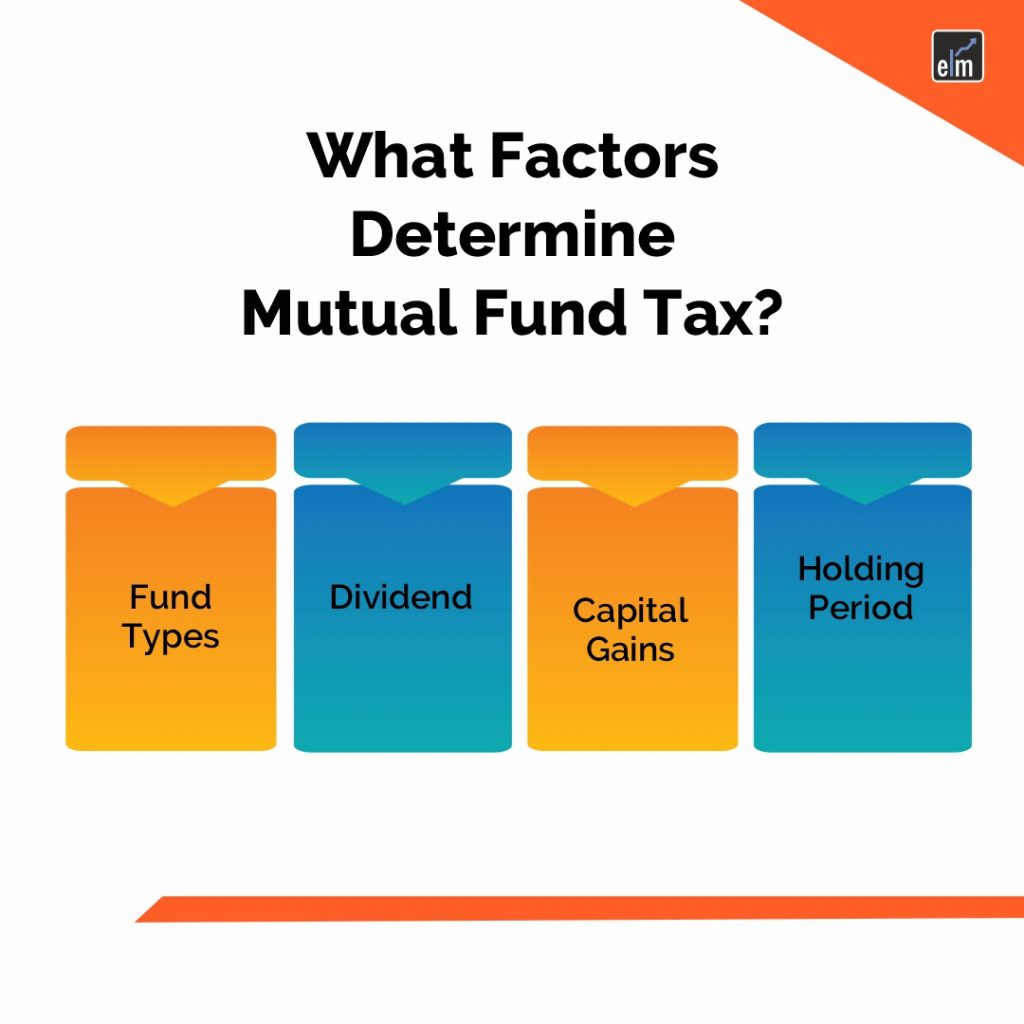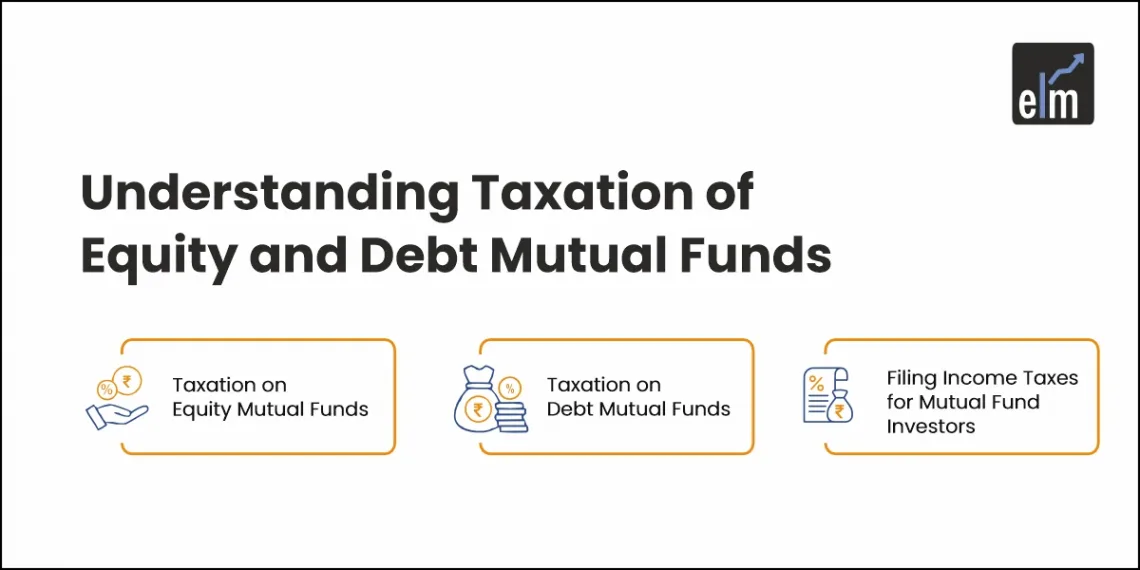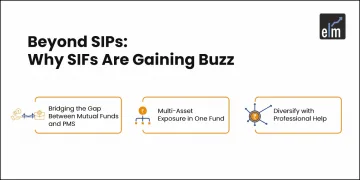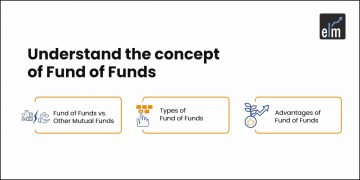In India, equity and debt mutual funds have become well-liked investment vehicles because they provide investors with a diverse portfolio that is overseen by financial professionals.
However, it’s essential to comprehend the equity and debt mutual fund taxes and fees related to mutual funds in order to make wise investment decisions.
Also, the end of the financial year 2023-2024 is approaching, and it is time to file our income taxes. Mutual Fund investors should know about the mutual fund taxes before filing their income taxes for this year.
Mutual fund taxes vary according to holding time and type (debt or equity). While debt funds over three years receive certain tax exemptions, equity funds held for more than a year are eligible for LTCG benefits. Both STCG taxes are levied at a flat rate or according to your income bracket.
Confused? Let’s understand in detail!
What Factors Determine Equity and Debt Mutual Funds Tax?
The following are the main factors that influence the taxes assessed on mutual funds:

1. Fund types
Depending on the kind of mutual fund, different tax laws apply. For instance, mutual funds that are equity, debt, or hybrid, etc.
2. Dividend
A portion of the profit that mutual fund companies provide to investors is known as a dividend.
3. Capital gains
A profit is referred to as a capital gain when investors sell their capital assets for more money than they originally invested.
4. Holding period
The interval of time between the mutual fund units’ purchase and sale dates. According to Indian income tax legislation, you will pay less in taxes if you hold onto your investment for a longer length of time. As a result, the tax rate that applies to your capital gains depends on the holding term. You are required to pay less tax the longer you retain the property.
Mutual Funds Taxation
Suppose you have invested Rs.50,000 through SIPs in mutual funds, now there can be two scenarios-
- Scenario 1: You have invested Rs. 50,000 in Equity Mutual Funds
- Scenario 2: You have invested Rs. 50,000 in Debt Mutual Funds
Taxation on Equity Funds
If you invest ₹50,000 in equity mutual funds through SIPs (Systematic Investment Plans) over the course of a year, and the fund delivers an average annual return of 12%, your investment could grow significantly thanks to the power of compounding. To estimate the potential returns more precisely, you can use a SIP calculator. It helps you plan better by projecting your investment growth based on the amount, duration, and expected rate of return.
Here is the tax rate break-up for taxation on equity funds (Source AMFI)
Long Term Capital Gains (LTGS)
Assuming a 12% annual return, let’s consider that your investment increases to ₹56,000 after a year.
Given that the holding duration exceeds a year, the full ₹6,000 gain (₹56,000 – ₹50,000) is considered long-term capital gain.
The long-term capital gains (LTCG) on equity mutual funds that surpass ₹1 lakh in a financial year are subject to a 10% tax rate, with no indexation.
Consequently, the full gain of ₹6,000 would be subject to the LTCG tax, meaning that ₹600 (10% of ₹6,000) would be the tax liability.
Short Term Capital Gain (STGT)
If you redeem it within a year, then Short Term Capital Gain will be applied at 15%, meaning that ₹900 (15% of ₹6,000) would be the tax liability.
Taxation on Dividends
Dividends paid by mutual funds were subject to the Dividend Distribution Tax (DDT) until April 1, 2020. As a result, investors received their payouts tax-free, and the fund house itself paid the DDT. However, the new tax system has outlawed the DDT.
Dividends received from stock mutual funds are categorized as income from other sources under the present system. This implies that you pay taxes on the dividends based on your income tax bracket and that they are directly added to your total income.
Taxation on Debt Mutual Funds
Assume you use SIPs to invest ₹50,000 over a year in debt mutual funds. Assume that the debt mutual fund yields an 8% annual average return and that the maturity period is 3 years.
Here is the tax rate break-up for taxation on debt funds (Source AMFI)
Long Term Capital Gains (LTGS)
LTGS on debt mutual funds applies to earnings obtained from redemptions made more than a year after the date of investment.
Tax exemption is granted on LTCG generated on debts funds held for more than three years, linked to inflation, up to Rs. 3,000. LTCG, which is more than Rs. 3,000 after indexation, is subject to 20% taxation based on your income tax level.
After the maturity period of debt funds, say 3 years, the 20% LTGS with indexation will be charged on the gains.
Short Term Capital Gain (STGT)
In the event that you cash in your investment within a year, the full ₹4,000 gain (₹54,000 – ₹50,000) would be regarded as STCG.
The tax rate on the STCG from debt mutual funds is determined by your income tax slab.
Taxation on Dividends
Like equity mutual funds, DDT would apply prior to disbursing dividends to you if the debt mutual fund declared dividends.
Securities Transaction Tax (STT)
STT is a tax that is gathered when securities are purchased and sold on an approved stock exchange. It’s a means by which the government can profit from trading in stocks.
The majority of mutual fund transactions are covered by STT, however, the rate and scope of application can change based on the kind of fund and the specifics of the transaction. This is an explanation:
1. Equity Mutual Funds Focused
Purchase Transactions: Investing in these funds (purchasing units) carries no STT.
Sell Deals: When you exchange your units for cash or delivery, an STT of 0.1% is applied to the entire transaction amount.
Intraday Trades: When buying and selling units within the same trading day, there is an additional STT of 0.025% applied to the total transaction value.
2. Gold ETFs and Debt Funds
Purchase Transactions: Investing in these funds entails no STT fees.
Sell Deals: When you redeem your units for cash or delivery, there is a 0.001% STT applied to the entire transaction value.
Intraday Trades: Similar to equities funds, an STT of 0.025% is applied to the entire transaction value.
The seller (mutual fund house) directly deducts STT at the moment of the transaction. It’s included in the amount you get back at redemption.
STT is a negligible outlay compared to other mutual fund fees, such as cost ratios. However, STT payments are not deductible from income tax when you file your return.
Income Tax Return Filing for Mutual Funds
Even though mutual fund income is not recorded separately on your Income Tax Return (ITR) in India, it is important to understand this process.
You’ll need the following information regarding your mutual funds when filing your ITR:
- Details of the mutual fund scheme: Name of the fund house, plan, etc.
- PAN (given by the fund house) for the mutual fund scheme
- Transaction Information: Dates of investment, redemption, and investment and redemption amounts, as well as any dividend income received
Declaring Capital Gains: Make use of the particular capital gains reporting schedule found in your selected ITR form. The LTCG/STCG for equity and debt funds is reported separately.
Income from Dividends: On your ITR form, report dividend income under the “Income from Other Sources” column.
Conclusion
Understanding taxation and charges in Indian mutual funds is vital for informed investment decisions. Diverse taxes, such as Capital Gains Tax and Dividend Distribution Tax, alongside charges, require investors to navigate these complexities. Consulting financial experts ensures optimal tax planning and maximized returns in mutual fund investments.
Discover how debt mutual funds can complement your investment portfolio and provide stability amidst market fluctuations.

Frequently Asked Questions (FAQs)
What are the types of taxes applicable to mutual funds in India?
In India, taxes on mutual funds include Securities Transaction Tax (STT), Dividend Distribution Tax (DDT), and Capital Gains Tax (CGT).
How is Capital Gains Tax (CGT) calculated on mutual funds?
The duration of holding units of mutual funds is used to compute CGT. For units held for a longer period of time, Long-Term Capital Gains (LTCG) and Short-Term Capital Gains (STCG) are applicable.
What is Dividend Distribution Tax (DDT) in mutual funds?
A tax known as DDT is applied to the dividends that mutual funds give to investors prior to distribution. Nonetheless, investors retain the tax-free status of their dividends.







